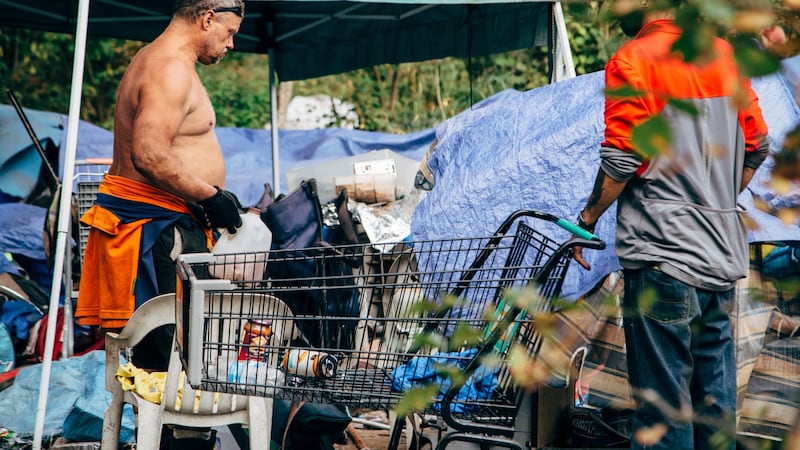What do homeless people say about reports that the men suspected in shocking crimes lived on the street?
The two men are among the most notorious criminal suspects in recent Portland history. Jeremy Christian is accused of fatally stabbing two men on a MAX train last month. George Tschaggeny is accused of stealing one of the men's belongings, including his wedding ring.
Both suspects were apparently homeless—and other homeless people fear they'll suffer backlash because of the high-profile crimes.
"It's gonna make it harder for us," says Kenneth Jackson, 38, who lives in a van in Northeast Portland.
After Tschaggeny allegedly stole Rick Best's wedding ring, wallet and backpack May 26, he returned to the spot underneath a nearby bridge in the Hollywood neighborhood where he'd been living.
Three homeless people who live nearby say they noticed blood and asked about it. They say Tschaggeny lied to them, telling them he tried to save Best's life.
Three days later, Leslie Preston says, they learned the truth.
"He's just a heartless, spineless, fucking piece of shit," says Preston, 45. "He walked up to me and told me he tried to save the guy on the train."

Preston, Jackson and Doll Crain spoke June 6 next to their van, parked in a gravel lot under a viaduct next to I-84. When shown Tschaggeny's booking photo, they instantly recoiled: spitting, shaking heads, swearing. The man is a bad apple, they say, and not like them.
The Oregonian reported June 11 that Tschaggeny lost his home and his marriage in the past five years after becoming addicted first to painkillers and then to heroin. Preston says Tschaggeny used "whatever [drugs] he could get his hands on," including meth, heroin and weed. But she doesn't think drugs could explain away his actions. "The fact of the matter is, drugs didn't make him do it," she says.
Jackson, Preston and Crain are concerned that people will look at Christian and Tschaggeny's actions and stereotype all local homeless people.
"We don't want any type of retaliation," Preston, 45, says.

In the past two weeks, homeless people living near the intersection of the I-205 multiuse path and Springwater Corridor in deep Southeast Portland say they've been attacked.
They say they don't know if the attacks stem from the news about Christian and Tschaggeny, or simply reflect growing tensions in the area that last summer was home to one of the largest homeless camps in the U.S.
"Last week, this dude threw three red bricks [at our tent]," says Loren Kurth, 35. "One landed on my old lady's gut. I woke up to her gasping for air."
Kurth, who June 6 wore a ballcap that read "DOPE" and carried a small machete, doesn't know the exact date but says the attack happened around 6 am while the pair slept in their tent adjacent to I-205. He jumped out of the tent but didn't respond with more violence, he says, instead calling police. He says his girlfriend's OK but still sore, and "skittish about going to sleep."

A man who gave his name as "John" says he was attacked a couple weeks ago by two "housies," slang for people with homes, when he tried to stop one of them from grabbing his bicycle.
"He starts coming at me, 'You fucking piece of shit, all you do is destroy the neighborhood,' said John, whose tarp-covered lean-to stands along the I-205 bike path at Southeast Woodstock Boulevard, near a "No Camping" notice posted by the Oregon Department of Transportation. "This old dude comes up behind me and pushes me down, kneels on my back and puts my hand behind me. I was just about in tears."
Nearby residents who come into frequent contact with houseless people say Christian and Tschaggeny have made them more afraid of homeless people, especially drug users.
Kelly Lawrence, 49, says she's used to seeing drug use during her daily commute along the I-205 bike path, but usually ignores it. Lately, she says, she's seen more open needle use, and is considering a new route.
"I used to put aside my fear," says Lawrence, a nurse. "But that [MAX stabbing] was a game changer. Now, I have a harder time blocking my fear." As she spoke, a man walked by with no shirt on, yelling at nothing and nobody—"symptomatic" of active drug use or untreated mental illness, in clinical language.
Police picked up Tschaggeny near Northeast Cesar E. Chavez Boulevard and I-84. It's not clear whether Christian was living on the streets or trying to avoid giving police an address. The stabbings happened on the MAX Green Line, which has stops close to the Springwater Corridor and I-205 path.
People who live along that route say the Green Line provides a connection between social services downtown and the camps in East Portland.

Angela Miller, 19, lives in a tent near the intersection of the Springwater Corridor and I-205. She says she was on a MAX Green Line train that was delayed due to the stabbings. She didn't know the men but says news reports—that Tschaggeny's life was destroyed by opioid addiction and Christian also struggled with drug use—mirror what she's seen.
"A lot of times, homeless people get caught up in drugs," said Miller, watching a man with a backpack whiz by on a small, gas-powered scooter. "They want to not feel the pain because of their living situation."
Miller said June 6 she'd been homeless only a week. "The streets are kind of scary," she says, but adds she feels safe because she doesn't use drugs and has friends in nearby tents.
"There is some people who I think are badasses," she says, "but I just don't mess with them."

Down and Out in Portland, Oregon is a weekly feature that answers the city's most pressing questions about homelessness by taking them to the people who know the issue best: those living on the streets. Look for a new installment weekly throughout the summer.
